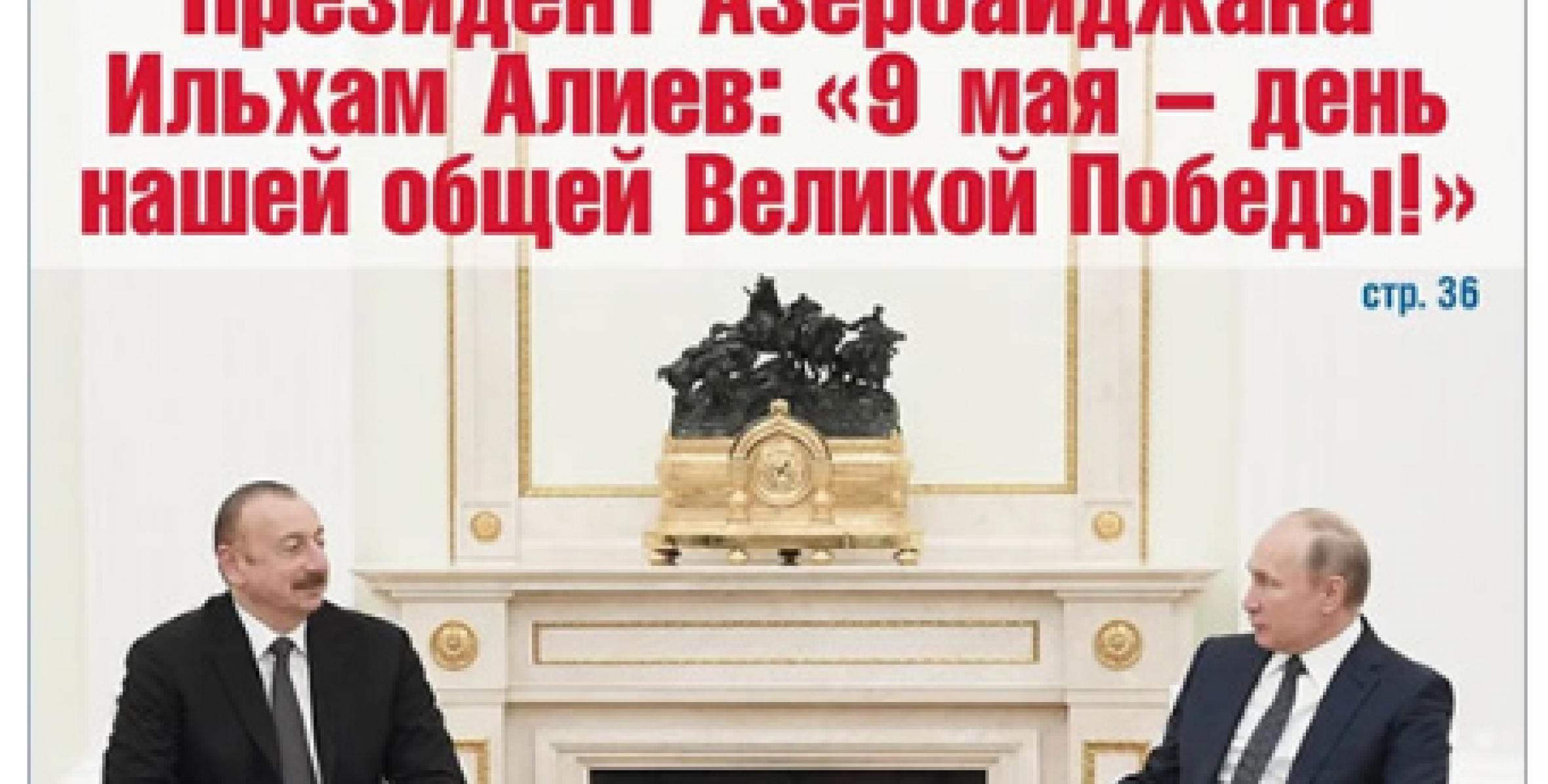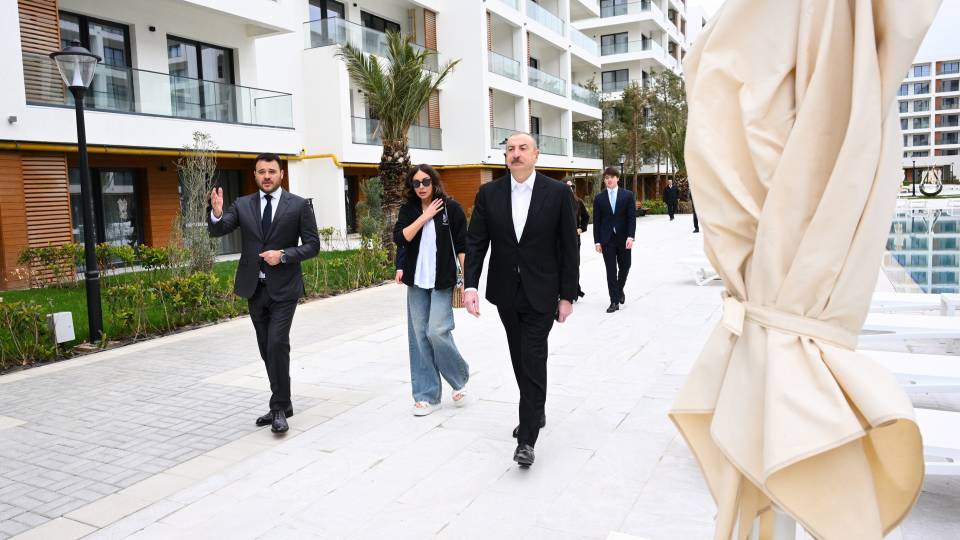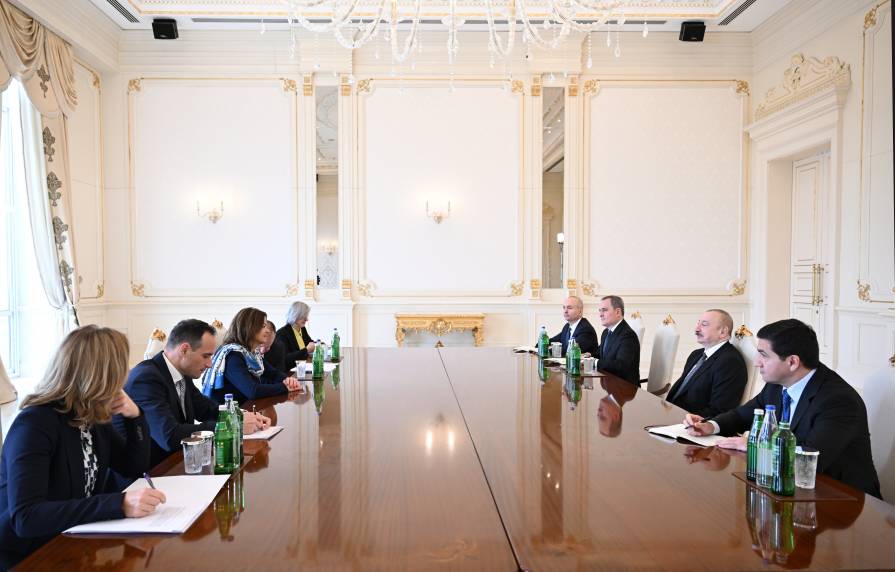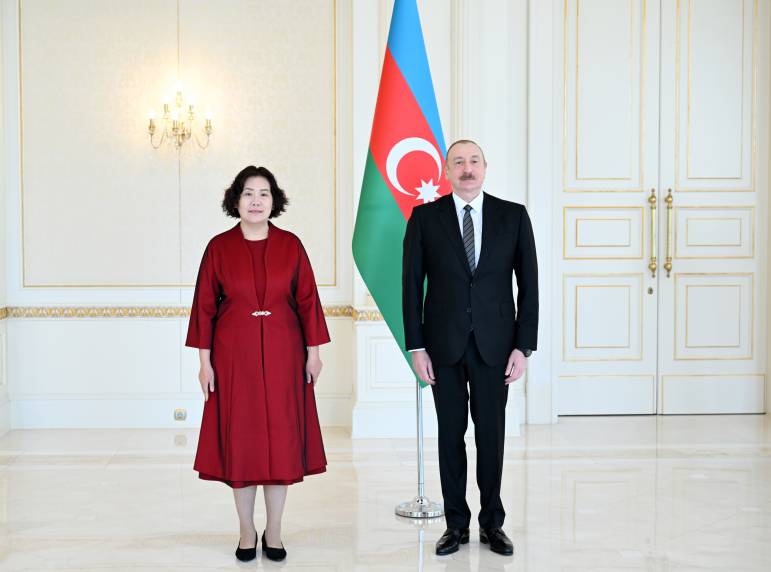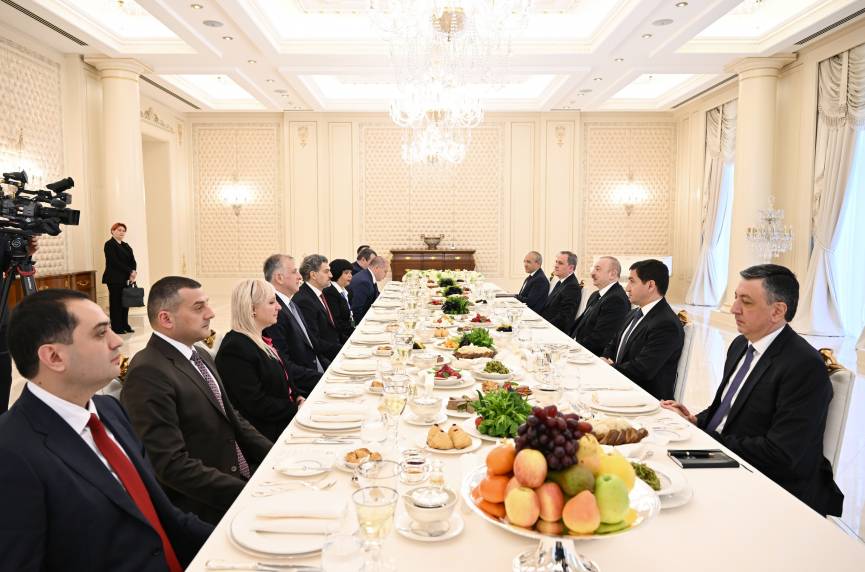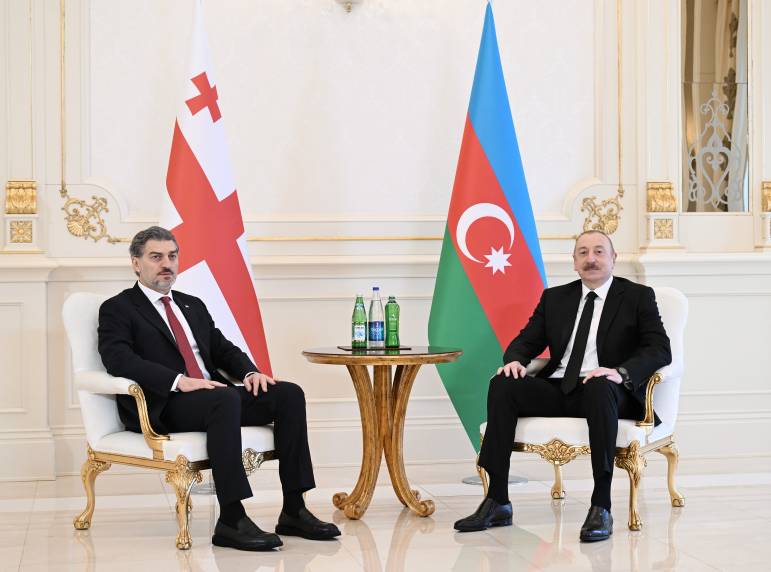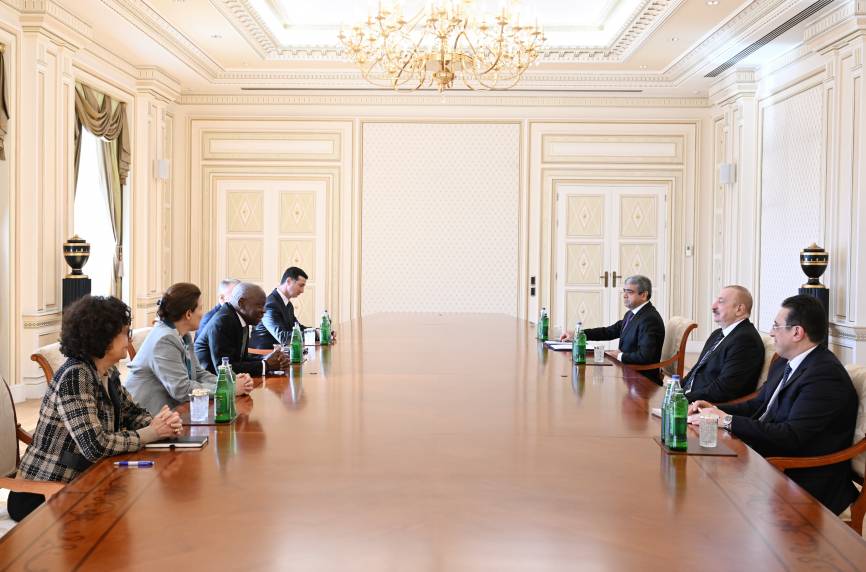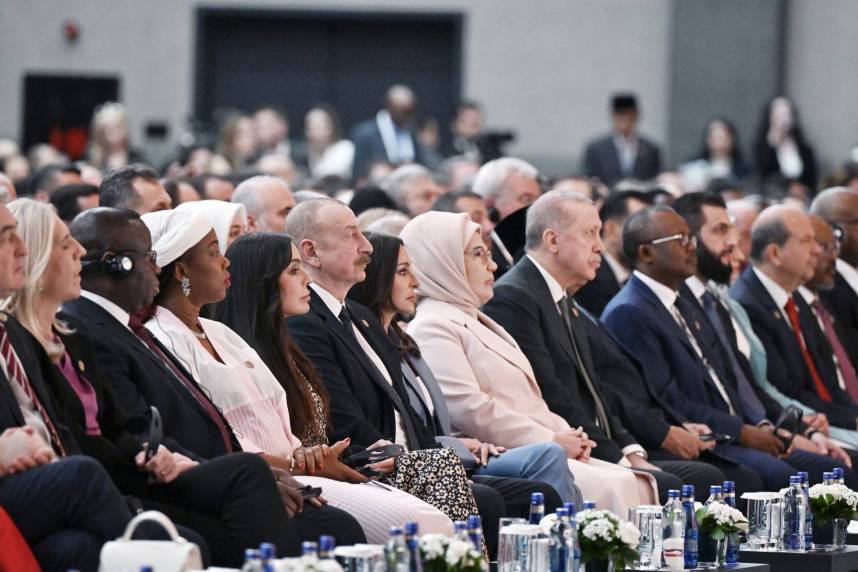The May edition of the influential Russian magazine "Natsionalnaya Oborona" (National Defense) has published an interview with President of the Republic of Azerbaijan Ilham Aliyev.
The magazine has a broad audience in Russia and at the international level, including representatives of official government agencies, diplomats, political and military experts, researchers and other specialists.
- Ilham Heydarovich, we are approaching the 75th anniversary of Victory in the Great Patriotic War. What is the contribution of Azerbaijan to the common Victory? How do you plan to honor the veterans of the Great Patriotic War living in Azerbaijan?
- The 75th anniversary of Victory in the Great Patriotic War is approaching. We cherish this date in history, honor the memory of those who contributed to the Victory on the battlefield and in the rear, pay tribute to the exploits of officers and soldiers who saved the world from fascism at the cost of their lives.
Azerbaijan has made a great contribution to our common Victory. More than 600,000 representatives of Azerbaijan participated in the war, 300,00 of them died, more than 120 heroes of the Soviet Union came from Azerbaijan, more than 170,000 of our soldiers and officers were awarded various orders and medals.
Azerbaijan provided 70 percent of oil, 80 percent of fuel and 90 percent of lubricants for the Red Army, without which victory in the war would not have been possible. And it is no coincidence that fascist Germany sought to capture Baku. In fact, I talked about this at the CIS summit in Ashgabat in October 2019: there is famous video footage where Hitler is presented with a cake that says “Caspian Sea” in German (dark chocolate is shown inside the borders of the Caspian Sea). He takes a swastika and puts it right where the word “Baku” is written. This underlines the plans of the Nazis to seize the oil fields of Azerbaijan.
Our enterprises manufactured military equipment day and night, including the famous “Katyusha”.
Representatives of Azerbaijani science have also made a significant contribution to our common victory. Not many people know this, but great Azerbaijani scientist Yusif Mammadaliyev invented the incendiary mixture which subsequently became known as the “Molotov cocktail”.
The 416th Taganrog Red Banner Division, which was formed in Azerbaijan, covered a glorious military path from the Caucasus to Berlin. Our country is proud of the exploits and courage of the soldiers of this division who, valiantly fighting on the fronts of the Great Patriotic War, held the banner of Azerbaijan high, demonstrated the best qualities of our people – patriotism, courage and unwavering spirit in protecting our native land.
In March this year, a delegation of the Rostov Region of the Russian Federation headed by Governor Vasily Golubev visited Azerbaijan.
During the meeting, I was presented with a video album dedicated to the visit in 1980 of national leader Heydar Aliyev, who was then heading Azerbaijan, to the Rostov Region. During that visit, he attended the opening of the Sambek Heights memorial, a symbol of the liberation of the Rostov region and dedicated to the heroism of soldiers of the 130th and 416th Azerbaijani rifle divisions, who showed exceptional courage. A national military and historical museum complex called the “Sambek Heights” is now being established next to the memorial. It was said at the meeting that the complex is scheduled for opening this year. We very much appreciate the fact that the Russian side honors the memory and feat of the soldiers and officers of the 416th Taganrog Division.
Today, veterans of the Great Patriotic War enjoy great state support in Azerbaijan. We always remember their heroic deed. Every year on 9 May, we meet at a ceremony dedicated to this great date, we lay flowers and wreaths together, and honor the memory of those killed. Unfortunately, in the early years of our independence this was not the case. When a group calling itself the Popular Front came to power in Azerbaijan through a military coup, it canceled the 9 May holiday, war veterans were subjected to persecution and moral terror. Almost the same things are happening in some countries now. And only after Heydar Aliyev returned to power was historical justice restored. Veterans began to enjoy the support of the state again, 9 May was declared a national holiday and we have been celebrating this holiday since 1994. It is a non-working day in Azerbaijan.
- At present, the fight against the glorification of Nazi criminals, including the post-Soviet space, is relevant more than ever before.
- Today we are seeing perilous trends towards rewriting history, glorifying the Nazis and distorting historical truth. And we must take this very seriously. It is categorically unacceptable to rewrite history or glorify fascism.
I would like to note that Russia and Azerbaijan have a completely identical position on this issue. We vigorously struggle against attempts to distort the truth about the Great Patriotic War, attempts to rewrite history and glorify fascism and fascists. Our positions are based on historical truth, justice and the fact that future generations should never doubt who the aggressor was, who the victim of aggression was, who won and at what cost this victory was achieved.
At the informal CIS summit in St. Petersburg last December, Russian President Vladimir Putin presented a number of documents from World War II many of which had previously been unknown. I believe that this was of great importance, as it shed light on a number of aspects related to the history of the war. Lack of information and knowledge of real facts often lead to a distortion of historical truth. In the issue of the history of World War II, this is fraught with such dangerous trends as rewriting history and glorification of fascism. Therefore, the disclosure of these documents, of course, serves historical truth.
Unfortunately, the glorification of fascism also takes place in the CIS, in particular in Armenia, where former authorities erected a monument to fascist executioner and traitor Garegin Ter-Harutyunyan, who served German fascists under the nickname Garegin Nzhdeh, right in the center of Yerevan. A large group of war veterans from the CIS countries has repeatedly expressed strong protest at this cynical step of the previous leadership of Armenia. In May 2019, the Russian Ministry of Foreign Affairs presented a report “Regarding the situation with the glorification of Nazism and the spread of neo-Nazism and other practices that contribute to fuelling contemporary forms of racism, racial discrimination, xenophobia and related intolerance”, which states as follows: “the former ruling Republican party of Armenia took steps to perpetuate the memory of such an ambiguous nationalist politician as Garegin Nzhdeh, for whom there is information on his collaboration with the Third Reich.” This is the position of the Russian Foreign Ministry.
The article headlined “The Activities of Military Counterintelligence in the Final Period of the War” in Volume 6, “Secret War, Intelligence and Counterintelligence during the Great Patriotic War”, of a 12-volume encyclopedia “The Great Patriotic War of 1941-1945”, published by the main editorial board of the Ministry of Defense of the Russian Federation chaired by Defense Minister Sergey Shoigu, says: “As part of an intelligence file for Obergrupp 114 Dromedar, counterintelligence agents have identified and arrested the former general of the Dashnak army and emigrant Ter-Harutyunyan, who served the Germans under the nickname of Nzhdeh. During the Great Patriotic War, he recruited more than 30 agents of Armenian nationality in Bulgaria, participated in their training and transfer to the rear of the Red Army for acts of sabotage. SMERSH detained 17 saboteurs and put the others on the wanted list.”
Nzhdeh also participated in the Holocaust of the Jewish population of Europe. In 1942, he organized the Armenian Legion who fought against the Soviet Union. In fact, Nzhdeh’s main slogan was “He who dies for Germany dies for Armenia”. No comment! Nzhdeh was arrested and ended his days in a Vladimir prison. And a monument almost 6 meters high was erected to this traitor and executioner in the center of the Armenian capital in 2016. Unfortunately, the new government of Armenia did not dismantle this monument. I believe that there is no place for the glorification of fascism in the CIS.
- In your opinion, what are the ways and principles for the settlement of the Nagorno-Karabakh conflict?
- Armenia’s aggression against Azerbaijan, which has been going on for more than 25 years, has led to the occupation of about 20 percent of the territory of our country. As a result, more than 1 million Azerbaijanis became refugees and internally displaced persons.
Both historical justice and international law indicate that Nagorno-Karabakh is an integral part of Azerbaijan. I should note that the name “Karabakh” itself is Azerbaijani. From a historical point of view, the khan of Karabakh, Ibrahim Khan, signed an agreement with the General of the Russian Empire Tsitsianov in 1805, according to which the Karabakh Khanate of Azerbaijan as an independent country became subordinate to the Russian Empire. In this agreement, called the Kurekchay Treaty – the text of it can be found on the Internet – there is no mention of the Armenian population of Karabakh. On the basis of other treaties – the Gulistan and Turkmenchay treaties signed in 1813 and 1828 respectively – the remaining territories of Azerbaijan were transferred to the Russian Empire. During this period, Armenians began to be resettled from Iran and Eastern Anatolia to the Karabakh region of Azerbaijan. Thus, hundreds of thousands of Armenian settlers ended up on historical Azerbaijani soil.
Later, in 1918, when the Azerbaijan Democratic Republic was established, one of its first decrees was a decree on the transfer of Irevan from Azerbaijan to Armenia and the declaration of it as the capital of Armenia. This is also a historical fact. In 1921, the Caucasian Bureau of the Bolshevik Party decided to retain Nagorno-Karabakh within Azerbaijan – to retain, not to transfer, as some Armenian historians write. This is also a historical fact. Another historical fact is that in 1923 the Azerbaijan Soviet Socialist Republic adopted a decree on the establishment of the Nagorno-Karabakh autonomous region within Azerbaijan.
And when Azerbaijan joined the UN, it did so within the framework of its territorial integrity. The Armenian-Azerbaijani Nagorno-Karabakh conflict must be resolved within the framework of the territorial integrity of Azerbaijan, the UN Charter adopted by the whole world and the Helsinki Final Act.
If we add to this four UN Security Council resolutions demanding an immediate and unconditional withdrawal of Armenian forces from the occupied territories, resolutions of international organizations such as the OSCE, the Non-Aligned Movement, the Organization of Islamic Cooperation, the European Parliament and others, as well as the fact that no country has recognized the illegal formation, the so-called “Nagorno-Karabakh republic”, we will see that a resolution of the conflict should be sought in the plane of recognition of the territorial integrity of Azerbaijan and respect for its sovereignty. Armenian troops must be immediately and unconditionally withdrawn from the occupied territories and refugees and internally displaced persons expelled from these lands must be able to return to their historical places of residence.
Not only Nagorno-Karabakh but also seven adjacent districts are occupied. Armenians have never lived in these seven districts.
In connection with the conflict, I should also note that yet another major blow has recently been dealt to the Armenian propaganda and the position of Armenia on this issue as a whole. In fact, they dealt this blow themselves. Of course, our focused activities and relations with international organizations have intensified this blow. I am talking about the notorious “election” of the so-called “president” held in the self-styled “Nagorno-Karabakh republic”. This “election” once again showed that no-one will ever recognize this illegal regime of the military junta. After the “elections”, leading international organizations did not recognize them and made open statements about that. A statement was made by co-chairs of the OSCE Minsk Group – Russia, USA and France. A statement was made by the OSCE Parliamentary Assembly, the European Union, the Organization of Islamic Cooperation, the Non-Aligned Movement and the European Parliament. All these organizations did not recognize the “election” and once again showed that Nagorno-Karabakh is an integral part of Azerbaijan. This has once again demonstrated – I said this before and I want to say it again – that Nagorno-Karabakh is Azerbaijan, exclamation mark!
We call on the international community and the OSCE Minsk Group co-chairs to put serious pressure on this aggressor country in order to get the peace process off the ground.
- How would you assess the current state of the Armed Forces of Azerbaijan?
- In recent years, Azerbaijan has made great strides in army building. The armed forces of the country are characterized by strong discipline, patriotism, high morale and fighting efficiency today. They are provided with the most modern weaponry and military hardware. All this, of course, has led to the strengthening of the country's military power in recent years.
According to the Global Firepower 2019 report, Azerbaijan is in 52nd place in the ranking of the most powerful armies in the world. I want to specifically note that we established the Ministry of Defense Industry in 2006. More than 20 military plants have been launched in recent years. These plants produce military products of more than 2,000 denominations, which our army is equipped with. At the same time, we already export military products.
In recent years, we have acquired the most modern equipment and weaponry. These include hundreds of armored vehicles, numerous patrol ships, warships, air defense systems, dozens of combat aircraft, more than a hundred combat, military transport and transport helicopters, the most advanced reconnaissance and combat unmanned aerial vehicles, air defense and missile defense systems, and the most sophisticated means of communications, multiple launch rocket systems, operational-tactical missile systems.
We attach particular importance to the social protection of our servicemen and the conditions of service for the military are improving. In recent years, dozens of military camps have been created. Service conditions are very good. Over the past few years, more than 80 percent of military units and military camps have been rebuilt or refurbished. In the next two to three years, all military camps will be completely renovated. Housing issues of the military are being addressed. Based on a decision made, the state provides free apartments to the servicemen with 20 years of excellent service in the army. Today, more than 20,000 civilians work in our military units. Previously, soldiers were engaged in this work. We have freed them from domestic work. At the same time, more than 20,000 jobs have been created for civilians.
Of course, all the above measures taken in recent years have led to even greater strengthening of the material and technical infrastructure of the Armed Forces and strengthened social protection of military personnel. We will continue to take steps in this direction.
- How would you characterize the state and prospects for the development of relations between Russia and Azerbaijan in the field of politics, economy, military-technical cooperation and in other areas?
- Azerbaijani-Russian bilateral friendly relations are successfully developing in all directions on the basis of strategic partnership today. There is a very active political dialogue between our countries. My numerous personal meetings with President Vladimir Vladimirovich Putin have given a very serious impetus to the development of bilateral cooperation and have positive effect on the situation in our region.
We are actively implementing the program within the framework of five roadmaps, which cover almost all areas of our activities - trade, transport, energy, humanitarian sphere and tourism. At the end of last year, two more roadmaps were added to these – on innovation and youth policy.
Last year, at the invitation of Russian President Vladimir Putin, I took part in a meeting of the Valdai Discussion Club. I was one of the four heads of state who received an invitation to this event, which attracts the attention of politicians, political scientists, experts and analysts all over the world every year. The Valdai Club has established itself as one of the most important platforms for discussing key issues on the world agenda.
Our relations with Russia are time-tested. Both parties call these relations the relations of strategic partners. And this is the case indeed. We are both neighbors and good friends. Our relationship has become much more effective and of good quality recently.
We actively interact within the framework of international organizations, traditionally support each other in the most important and pressing issues. We have close cooperation within the UN, OSCE and, of course, the CIS.
We have very close trade and economic relations. About 700 companies with Russian capital operate in Azerbaijan. Mutual investments worth billions of dollars are being made.
The turnover between our countries last year grew by almost 20 percent to reach more than $3 billion.
It is very important to note that, despite the situation with the coronavirus pandemic, trade between our countries grew by 2 percent in the first quarter of this year. The volume of export-import operations has also increased. It is very important that the North-South transport corridor continues to operate, including freight and transit traffic within this corridor. The North-West corridor from Russia through Azerbaijan to Europe has also been launched.
The opening at the end of last year of a bridge over the Samur River on the border of Azerbaijan and Russia was an event that is important not only for the two countries, but also for the region as a whole. Because it creates new opportunities for stepping up international cargo transportation, expanding business ties and for developing the North-South and North-West transport corridors. Last year, freight traffic along the North-South corridor grew by 60 percent. Azerbaijan has completed on its territory all the work related to the implementation of this important transport project, which opens up good prospects for cooperation in the region and will significantly reduce the distance and time for delivering goods from Asia to Europe and vice versa. I believe that the demand for the North-South corridor as an important transport artery in the region will grow.
Our military and technical cooperation is also actively developing. It was announced during one of the joint press conferences of the Presidents of Russia and Azerbaijan that the volume of military products purchased by Azerbaijan from Russia constitutes $5 billion.
Our relations in the humanitarian sphere are also developing successfully. A branch of Moscow State University has been operating in Azerbaijan for many years, as well as a branch of the First Moscow State Medical University. All state universities in Azerbaijan have departments in the Russian language. A total of 25,000 students in our country receive their university education in Russian. Besides, 130,000 schoolchildren study in 338 Russian-language schools.
One indicator of our relations explicitly shows the spirit and nature of relations not only between countries but also between peoples. In 2019, a record number of Russian tourists – about 1 million people, visited Azerbaijan. Good dynamics were observed at the beginning of this year.
However, the coronavirus pandemic stopped the flow of tourists. We hope that after the pandemic and the opening of borders, trips of Russian tourists to our country will resume. After all, the Russians feel comfortable here, they feel at home and do not experience any difficulties associated with the language barrier. It is no secret that tourists are not only interested in seeing the sights and trying the national cuisine, they go where they feel safe, comfortable and at home.
On 23 November last year, the “Azerbaijan” pavilion reopened after major restoration at the Exhibition of Achievements of National Economy in Moscow. The opening of the “Azerbaijan” pavilion at this exhibition was another manifestation of the friendly nature of relations between our countries.
- What is the contribution of Azerbaijan to global strategic and energy stability?
- I have repeatedly said that the energy security of each country is an integral part of its national security. Therefore, the main task for us was to ensure energy independence, and we have achieved it.
In recent years, Azerbaijan has evolved from an importer to an exporter of electricity and natural gas. Since 2003, more than 30 power plants have been built in Azerbaijan. We have been exporting our surplus electricity for several years. By the way, we pay great attention to the environmental state of the country, which is why the power plants built in Azerbaijan in recent years meet all environmental requirements and operate on the basis of natural gas and water resources of the republic.
We also pay great attention to the development of renewable energy in Azerbaijan. In January of this year, a preliminary agreement was reached with two large foreign companies with extensive experience in the field of renewable energy. According to these agreements, two power plants with a capacity of 440 megawatts will be built in our country – one wind and the other solar - exclusively at the expense of foreign investors.
We have completely upgraded the electricity infrastructure. According to the rating of the Davos World Economic Forum, Azerbaijan ranks second in the world in terms of the accessibility of electricity.
As for the implementation of large transnational oil and gas projects, seven oil and gas pipelines have already been built, exporting our energy resources in several directions.
The construction of the Southern Gas Corridor, which consists of four projects, is approaching successful completion:
• The Shah Deniz-2 gas condensate field with reserves of more than 1 trillion cubic meters
• The South Caucasus gas pipeline
• The Trans-Anatolian Gas Pipeline (TANAP)
The implementation of the above three projects has already been completed.
• The construction of the Trans Adriatic Gas Pipeline (TAP) is 94 percent through.
Also, a new gas condensate field “Absheron” with reserves of at least 300 billion cubic meters of gas was discovered relatively recently. Production from it is expected to start next year. In March of this year, the major oil field “Karabakh” was discovered. Several more promising oil and gas structures are in the exploration and development phase. Thus, all this will ensure a stable profile of oil production and an increasing volume of natural gas production.
From the very beginning, we have been actively involved in the OPEC+ format. I want to note that the idea of the OPEC+ format was first introduced by me at a panel discussion of the Davos World Economic Forum several years ago. Azerbaijan also actively participated in the 9th and 10th OPEC+ meetings. Like other participants in these meetings, Azerbaijan made a commitment to reduce oil production, showing itself as a reliable and stable partner.
I am pleased to note that, as in all other areas of our bilateral relations with Russia, Azerbaijan has many years of successful cooperation experience in the energy sector, and I am sure that these relations will also be actively developing in the future.
In conclusion, I would like to congratulate the friendly people of Russia on the upcoming 75th anniversary of Victory in the Great Patriotic War. I was invited by the President of the Russian Federation Vladimir Putin to the Victory Day celebrations in Moscow on 9 May and intended to participate in this festive event. Unfortunately, due to the coronavirus pandemic, this event was postponed to another time. 9 May is our common holiday, the day of our common Great Victory! The attitude of Azerbaijan and Russia towards this victory brings our countries and peoples closer together.

